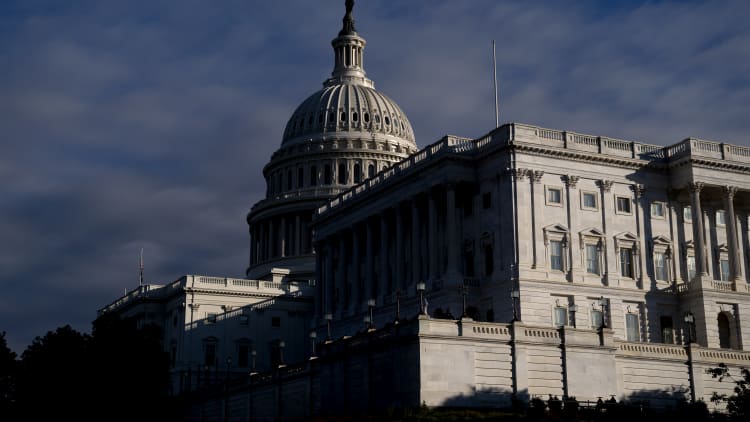
Update: The House passed the social spending and climate bill on Friday morning. A previous version of this story is below.
The House moved toward a vote on President Joe Biden's social safety net and climate plan Friday morning after a key analysis said it would slightly add to budget deficits over a decade.
Following the release of the Congressional Budget Office estimate, House Democrats teed up a final vote on the legislation Friday morning. They intended to pass the bill Thursday night, but delayed the vote early Friday as House Minority Leader Kevin McCarthy gave rambling remarks in which he not only criticized the spending bill but also most aspects of the Democratic-led government in Washington this year. He talked for more than eight hours in a record-long House floor speech.
A handful of centrist House Democrats wanted to see the nonpartisan CBO's projection of how the Build Back Better Act would affect long-term deficits before they voted for the plan.
The $1.7 trillion bill would increase the budget deficit by $367 billion over the years 2022 to 2031, according to the CBO. The topline figure does not include estimates for revenue raised by increased IRS enforcement of tax laws.
The Treasury Department has contended the provision will generate another $400 billion and pay for the plan. The CBO estimated it would lead to only $127 billion more in net revenue, which would leave the bill's spending roughly $250 billion short of being fully offset. That would put it approximately in line with the CBO's estimated deficit impact for the bipartisan infrastructure law Biden signed earlier this week with the support of Republicans and centrist Democrats alike.
The legislation aims to make child care more affordable, extend the enhanced child tax credit for a year, create universal pre-K, speed up the transition to green energy and expand Medicare and Medicaid. At least one part of the House plan — four weeks of paid leave for most Americans — could get cut once the bill goes to the Senate.
Along with the bipartisan infrastructure law signed this week, the package makes up the core of Biden's economic agenda. Ahead of the vote Friday, House Speaker Nancy Pelosi cast the plan as a historic step for households.
"We, this Democratic Congress, are taking our place in the long and honorable heritage of our democracy with legislation that will be the pillar of of health and financial security in America," she said.
The budget estimate assuaged the concerns of at least two of the five Democratic holdouts: Reps. Stephanie Murphy of Florida and Kurt Schrader of Oregon. At least one Democrat, Rep. Jared Golden of Maine, will vote against the bill, the Bangor Daily News reported.
Pelosi can lose only three votes and pass the legislation. If Democratic leaders can prevent enough defections to pass the bill, it will mark a breakthrough for the party in a months long slog to pass what it views as transformational investments.
For comparison, the CBO projected the bipartisan infrastructure package backed by nearly all House Democrats and 13 Republicans would add $256 billion to deficits over a decade. The agency estimated the 2017 Republican tax law signed by then-President Donald Trump — one of the last huge bills pushed through Congress that was not an emergency coronavirus aid plan — would add nearly $1.5 trillion to deficits over 10 years.
If the House passes the bill this week, the Senate aims to approve it before Christmas, Senate Majority Leader Chuck Schumer said. If the Senate makes changes to the legislation, it would have to go back to the House for another vote.
Tweaks in the Senate — which could include scrapping a paid leave program or revising a proposal to lift the cap on state and local tax deductions — could change the deficits effects by tens of billions of dollars.
Democrats have touted a previous estimate from the nonpartisan Joint Committee on Taxation projecting the bill would not add to long-term budget estimates. But five Democrats — enough to sink the bill on their own in the House — said they wanted to see the CBO score as well before they backed the legislation.
Democrats indicated they believed the nonpartisan scorekeeper would underestimate the money raised by pieces of the package, such as the additional IRS funding. After the CBO released its projection, Treasury Secretary Janet Yellen reiterated the Biden administration's view that the plan would not add to long-term deficits.
"With this bill, members of Congress have a unique opportunity to put our economy on a path to increased growth, productivity, labor force participation, and equity, while ensuring we do not burden future generations with unsustainable debt. I urge them to pass it," she said in a statement.
The White House didn't immediately respond to CNBC's request for comment.
In a tweeted statement citing the Treasury estimate, Biden said his "Build Back Better Act is going to reduce the deficit by more than $100 billion over ten years."
"It's going to lower costs, create jobs, and rebuild our economy. Let's get this done," he said.


